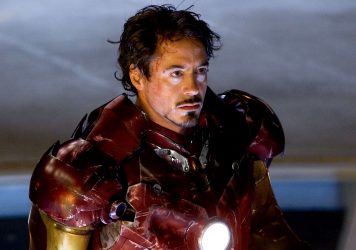Jon Favreau’s Iron Man ticks all the boxes of the comic book geek pleaser.
Jon Favreau’s Iron Man is full of visual flash and dash, boasts a sly sense of humour and an actual flesh-and-blood performance from Robert Downey Jr as the titular superhero.
Robots fly, stuff explodes, girls pout, evil is bested, good triumphs. And it all happens under sun-dappled skies in beachside mansions filled with fast cars and hot women, where everything – women included – has the soulless surface texture of polished marble.
This is the world of billionaire arms dealer Tony Stark (Downey Jr), whose company, Stark Industries, is making the world a Safer Place™ by funnelling ever more outlandish instruments of death to the American government. But when Tony is rudely awakened to the true cost of his business by a gang of Arab terrorists, he resolves to do something to right his wrongs. Look out bad guys: Iron Man is born.
Iron Man is what an above average blockbuster looks like these days: more human than Spiderman, more controlled than Transformers, and with a more profound sense of its own absurdity than either Batman or Superman.
But Iron Man is much more besides. It’s a seductive fantasy of power at a time when America has never felt so emasculated. Here is a vision of America as it wishes it was, with the power to do what it wants, when it wants and where it wants. This is unilateralism as it should have been: where democracy really can be fired from an electromagnetic hand cannon, and the unwashed towelheads might actually look grateful for a change.
While offering, on the one hand, the apparently liberal sentiment that arms dealing is bad (and it’s not really arms dealing per se, just a lack of corporate oversight), with the other, Favreau presents a deeply conservative ideal of unchecked aggression and the emancipating spectacle of violence. The intoxicating connection between power, money, politics and manhood couldn’t be more obvious if Stark’s suit had a giant iron penis dangling between its legs.
It’s also wilfully naïve, perhaps just plain offensive, in its presentation of a ‘terrorist’ threat stripped of any historical, religious or political context. These are the terrorists of George Bush’s fever dreams: incomprehensible, ahistorical, outside the paradigm of cause and effect. They are, effectively, just vermin to be squashed beneath an iron jackboot.
Of course, Hollywood blockbusters can’t afford to be politically liberal because they’re bankrolled by corporate America. And nowhere is this more obvious than Iron Man’s relentless cavalcade of product placement that’s more like flicking through the ads of a luxury lifestyle magazine than watching a film.
It’s not that Iron Man lacks creative endeavour. Downey Jr is a charismatic lead and Favreau is a competent if uninspired director. It’s just that, well, why should the bar be so low? Why shouldn’t a blockbuster just try, a little, to be smart? Why does the soundtrack have to evoke the blaring metal music of America’s Afghanistan campaign? Where is its sense of irony? Of propriety? Of historical context?
It’s telling that we use almost any term to describe these pictures – blockbusters, tentpoles, products, franchises – except what they are, or at least should be: cinema. It’s what we all love, and we love it because it excites us and makes us think and opens our eyes and gives us a sense of wonder about the limitless possibilities of the world.
Why can’t summer films do that too, instead of settling on the season like a dead weight? Like a great, crushing lodestone. Like an empty iron suit?
Published 2 May 2008

The founding Avenger could be about to hang up his suit. Who’s ready to become the MCU’s new MVP?

Marvel lays it all on the line in their pan-property pièce de résistance – a full-tilt triumph of blockbuster filmmaking.